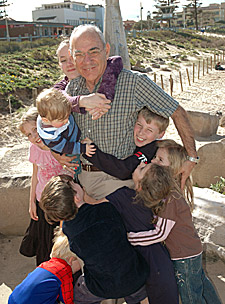More than most people, Bruce Ballantine-Jones can surprise you.
For the hundreds of people impacted by Bruce's leadership and teaching at Jannali Anglican Church since 1978, it may come as a surprise to discover just how much their senior minister has influenced the life of Sydney Diocese and the Anglican Church of Australia since the early 1960s.
For those in the wider Anglican Church who crossed paths with Bruce during that time, it may be surprising to learn that he only ever saw those projects as "icing on the cake', and his focus was always Jannali.
Given his reputation, what might surprise everyone is his insistence that he hates conflict.
"I have a reputation for being a fighter, but I always hated it," Bruce says.
"If the cause was important enough, and I had no other choice, I would fight for what I believed in. But I never enjoyed it."
After 28 years, Bruce Ballantine-Jones will retire as rector of Jannali " and from most of his official diocesan commitments " next month, although he hopes to continue as deputy chairman of the Glebe Administration Board.
Some 43 years after first joining Synod, and with 20 years on Standing Committee, terms as President of the NSW Council of Churches and the Anglican Church League, and membership of General Synod plus more diocesan committees than he can recall, what will he remember most?
"To me, Jannali was always the main event," he says.
 During Bruce's tenure, attendance at Jannali grew from 75 to over 500 every Sunday.
During Bruce's tenure, attendance at Jannali grew from 75 to over 500 every Sunday.
The 1979 Billy Graham Crusade provided a major influx, and constructing a new building and employing more staff were also crucial moments.
In that time, some 35 people left Jannali, either singly or as couples, for theological study and full-time ministry or missionary work.
Growth brought many challenges, including the need to try new things and be willing to fail. But he says occasional disappointments come with the territory.
"An idea may work for a while, but you find it has a use-by date. You don't keep something that's not serving the overall purpose," he says.
"What's important is to have a broad strategy, to work out how programs and activities fit into that strategy, and not deviate."
Alongside his time at Jannali, Bruce has been on the front lines of many of Australian Anglicanism's major "battles', particularly during the volatile 80s and 90s.
His own understated assessment is that he is "a fairly controversial person on a whole range of issues'.
What may be unknown to many is his involvement in fighting organised crime " lobbying the government and working behind the scenes with investigative journalist Bob Bottom to help establish bodies such as the Independent Commission Against Corruption (ICAC) and the Australian Crime Commission (ACC).
"It brought real benefits to the whole community, even though it hasn't been obvious to the ordinary person," he says.
"Our involvement in helping to set up the ACC and ICAC helped to change the culture, so corruption in public life was no longer tolerated."
In all his ministries, Bruce repeatedly points out two things: his complete dependence on God, and his partnership with wife Raema, who died last year after battling cancer.
"Raema and I were a great team. She was with me in everything I did," he says.
"The fact that I had a totally satisfying marriage and family life, and that she was fully supportive of everything, made an enormous difference to whatever I did."































